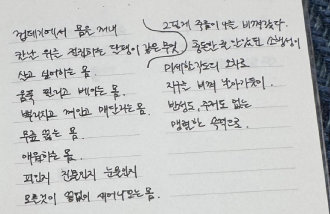Prosecutors Zero In on PM Golf Outing
Prosecutors Zero In on PM Golf Outing
Posted March. 13, 2006 08:06,
Prosecutors investigating the recent scandal over Prime Minister Lee Hae-chans golf outing on Independence Movement Day are focusing on whether the golf outing had to do with illegal entertainment, whether stock price manipulation was attempted, and whether a flour price-fixing deal was made.
Speculation abounds, and the Financial Supervisory Service (FSS) began its own investigation recently, which could delay the final outcome of the prosecutions investigation.
The Grand National Party (GNP) argues that Prime Minister Lee and Vice Education Minister Lee Ki-woo attending a golf outing and a dinner paid for by others is tantamount to bribery.
The GNP claims that since Vice Minister Lee is in charge of supervising the Korean Teachers Credit Union (KTCU), which purchased stock in the Youngnam Flour Mills Company (YFMC), his golf outing with YFMC officials was related to his work. It also believes Prime Minister Lee is no exception in the case, as he usually takes charge of overall state affairs.
It is too early to conclude that the prime ministers golf outing with the businessmen was an example of bribe taking, one prosecutor said.
What matters are the conversations that were held during the golf outing. If YFMC Chairman Yoo Won-gi and others asked for help regarding the Fair Trade Committees (FTC) investigation into flour price fixing, or talked about purchasing YFMC stock via the KTCU, it might be recognized as attempted bribery. But it will not be easy to prove such charges if those involved strongly deny it.
Stock Price Manipulation?-
In cooperation with the FSS, prosecutors are expected to push for an investigation based on FSS accusations.
The first area of investigation is whether the KTCUs purchase of YFMC stock was appropriate. An internal investment team from the KTCU reportedly suggested to wait and see last August. Nevertheless, the KTCU bought YFMC stock four times and ended up suffering losses of some 8.4 billion won.
Meanwhile, the YFMC disposed of 1.95 million shares of its own outside the exchange market after its cooperation with the KTCU led to a surge in stock prices and profits of over 6.7 billion won in capital gains.
If it turns out that outside pressure was involved in the KTCUs investments, the parties involved could be punished for misfeasance charges. If they caused losses by purchasing stock recklessly, KTCU officials could be charged with malfeasance in office.
Even more problematic are the two or three golf outings that Vice Minister Lee had with YFMC Chairman Yoo, KTCU Director Kim Pyeong-soo, and others last October through December.
The meetings coincided with the KTCUs purchases of YFMC stock, which gave a boost to the companys dwindling stock price, and the YFMCs several billion won in capital gains. If some KTCU officials or participants in the golf outings received rewards for the capital gains, they are highly likely to face legal action against them.
Another major area of investigation is whether the KTCU was aware of the request for altering the use of a YFMC plant site when it first purchased YFMC stocks last May. This could be an important clue in judging possible charges of stock price manipulation and collusion.
Possible Collusion over Flour Prices-
It is highly likely that the investigation into collusion among the YFMC and seven other flour milling businesses over the amounts and prices of flour might be less intense because the FTC already announced the result of its own investigation and decided to enter complaints against the relevant parties.
Nevertheless, the case might emerge later as the key issue of the scandal if the reason why YFMC Chairman Yoo was excluded from the list of those accused by the FTC becomes known, or if it turns out that Chairman Yoo made illicit requests of Prime Minister Lee and other participants during the golf outing on March 1.
woogija@donga.com




![“어깨 아프면 약-주사 찾기보다 스트레칭부터”[베스트 닥터의 베스트 건강법]](https://dimg.donga.com/c/138/175/90/1/wps/NEWS/IMAGE/2026/01/30/133269934.1.jpg)


